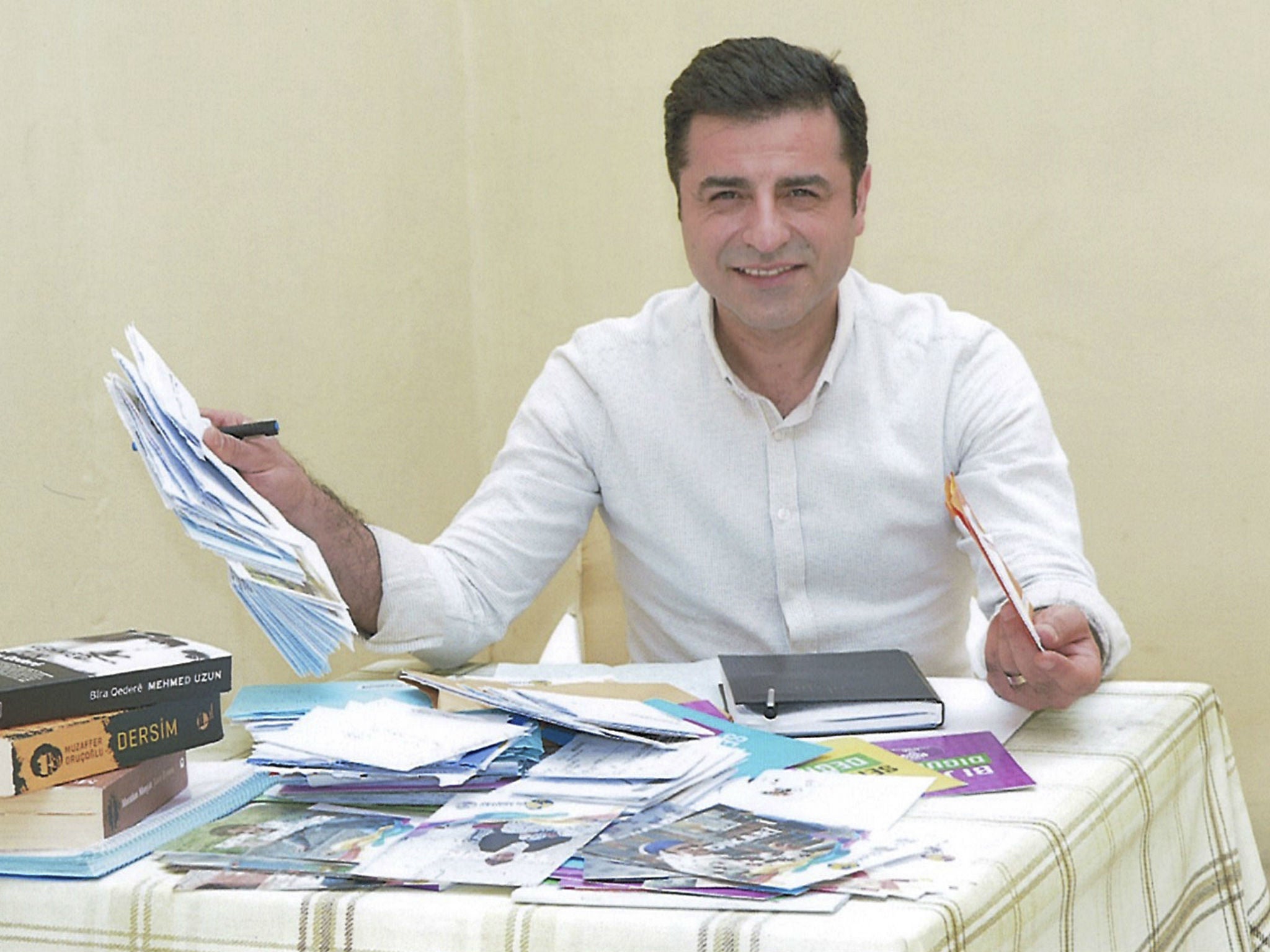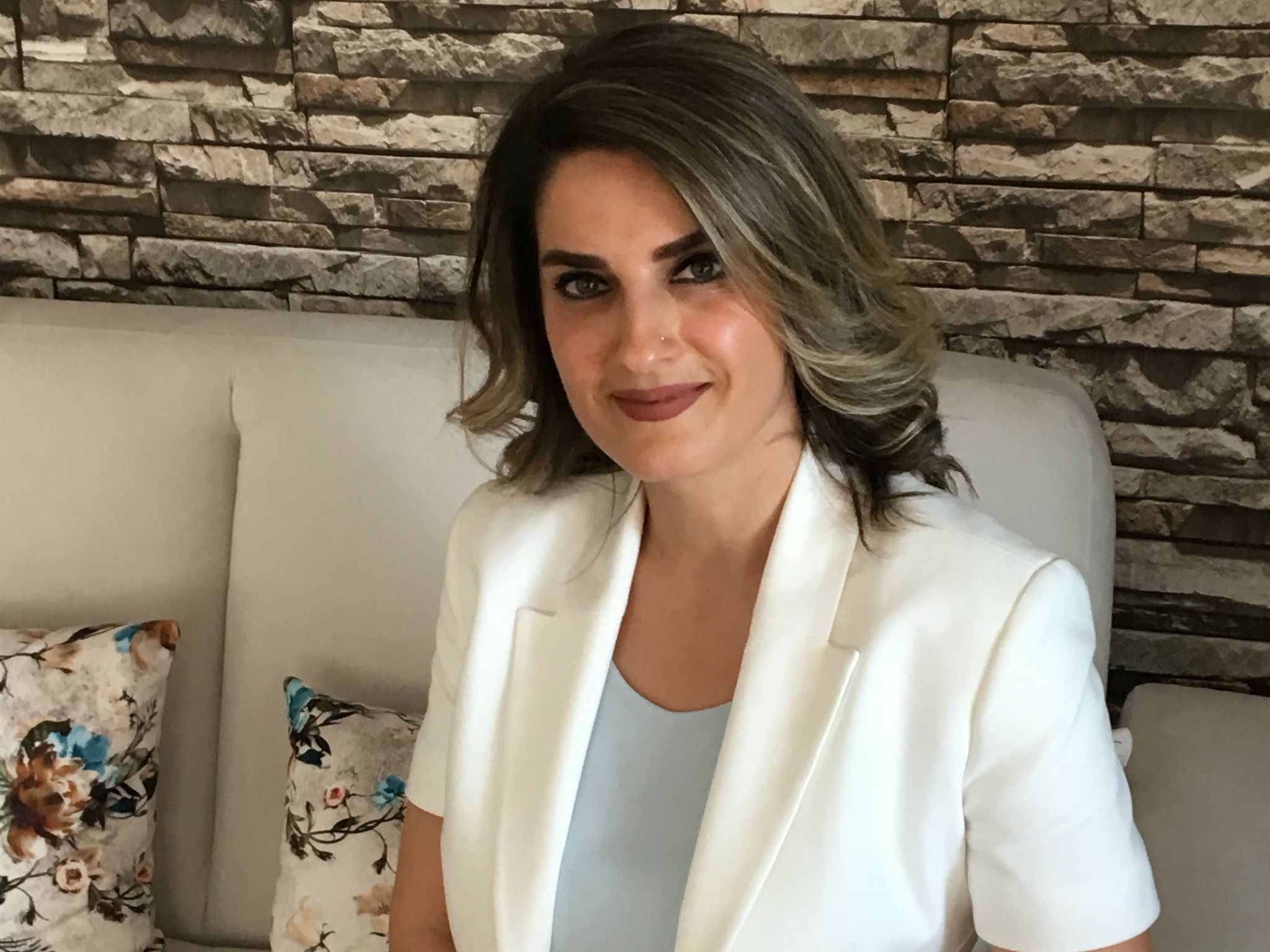Turkey election: As Selahattin Demirtas runs for presidency from jail, Kurdish voters could still hold key to vote
'There is a need for reform,' says Demirtas' wife Basak as opposition groups look to take away the parliamentary majority enjoyed by Erdogan's ruling AKP

Your support helps us to tell the story
From reproductive rights to climate change to Big Tech, The Independent is on the ground when the story is developing. Whether it's investigating the financials of Elon Musk's pro-Trump PAC or producing our latest documentary, 'The A Word', which shines a light on the American women fighting for reproductive rights, we know how important it is to parse out the facts from the messaging.
At such a critical moment in US history, we need reporters on the ground. Your donation allows us to keep sending journalists to speak to both sides of the story.
The Independent is trusted by Americans across the entire political spectrum. And unlike many other quality news outlets, we choose not to lock Americans out of our reporting and analysis with paywalls. We believe quality journalism should be available to everyone, paid for by those who can afford it.
Your support makes all the difference.Just 10 minutes is all the time that Selahattin Demirtas is allowed on the telephone to his wife once every fortnight from his prison. He uses the calls to send campaign messages which are turned into videos on social media, attracting millions of followers.
This is just one way in which opposition candidates are getting around the draconian restrictions placed by the government of Recep Tayyip Erdogan to keep them from the airwaves. And they are of crucial importance to Mr Demirtas, who leads the Peoples’ Democratic Party (HDP), and whose Kurdish supporters are likely to hold the critical balance in what is being viewed as the most important election in Turkey’s modern history.
Mr Demirtas, a charismatic former human rights lawyer, is one of Turkey’s best known politicians, winning votes for the HDP beyond his core Kurdish support at the last election. He, other MPs, and hundreds of party members were arrested by the Erdogan government for alleged links to the Kurdistan Workers’ Party (PKK) which has been engaged in decades of armed strife against the Turkish state.
Basak Demirtas has been visiting her husband at the jail in Edirne, 1,600 km (994 miles) from the family home in Diyarbakir, every week, a journey which involves flights and a lengthy drive. “They basically chose the furthest point in the country possible from here to take him. It is part of the psychological pressure the government wants to place not just on Salahattin but his family as well, to try and break us,” she told The Independent. “But we are not breaking, the people are not breaking, despite every obstacle Erdogan and his people puts up, we are making great progress in this campaign.”
Mr Erdogan’s decision to call a snap poll is looking a riskier gamble by the day. Instead of delivering the sweeping mandate for an imperial presidency he and his cohort had expected, the vote appears to have galvanised his opponents with a sense of purpose and drive and the incentive for unprecedented cooperation on strategy.
It is seen as a sign of just how rattled Mr Erdogan has become that he has raised the possibility, for the first time, of a coalition if his Justice and Development Party (AKP) led alliance fails to get a parliamentary majority. This is a clear volte-face from his previous stance that not only would there be no need for his party to follow such a path, but that a coalition was not permissible under the country’s constitution passed by last year’s referendum.
Similarly the president’s pledge a few days ago to end the state of emergency – brought in the aftermath of the failed coup of two years ago blamed on the exiled cleric Fethullah Gulen - is viewed as being recognition of weariness across society of the unremitting punitive measures. More than 50,000 people remain in prison while another 140,000 have been fired or suspended from their jobs.
The HDP getting 10 per cent or more of the votes in the parliamentary election would almost certainly mean that the opposition parties could form a majority. A failure by Mr Erdogan to gain 50 per cent or more in the presidential poll, running in tandem, would mean he would be forced to a second round run-off in which his opponents have promised to unite behind one candidate, most likely Muharrem Ince of the Republican Peoples Party (CHP). This is particularly significant for the Kurdish areas where the community have been traditionally opposed to the Kemalist party which had backed military crackdown in the past against the Kurds.
Mr Demirtas has already spent 20 months in custody without being brought to trial. Mr Ince, who opposed the decision of the CHP to vote with the government to lift parliamentary immunity from Mr Demirtas and other HDP MPs - clearing the way for their prosecution - has visited him in prison to show solidarity and also discuss campaign policies.
Speaking about her own visits to her husband, Ms Demirtas said “It is tiring trip, but I always feel a great boost of energy knowing I would be meeting him. We talk separated by a glass screen, on a phone. His voice does not sound like his own on the line, but at least I get to see him.
“We discuss things about our family, our daughters, but there is a lot to talk about in politics, about the election, all that needs to be done. I take him books, papers. He says he does not want to feel sorry for himself, that others are also facing hardship, he wants to focus on the campaign.”
Mr Demirtas’s personal campaign “headquarters” is a 12 square-metre cell he now shares with a colleague after being kept in solitary confinement for months. At the same time he is preparing his defence on legal charges which carry a sentence of 142 years if he is convicted.
“All his conversations with his lawyers are recorded, they face all obstruction all the time. This Government can really do anything they like,” said Ms Demirtas at her home, as she went through the documentation on the indictments. “You cannot really have rule of law unless you have a democratic state. We believe that the election will bring back democracy to this country. But people are worried that there will be corruption, they are worried about what may happen to ballot boxes.”

Concern about “dirty tricks” had heightened after a leaked video became viral on social media in which Mr Erdogan is shown exhorting AKP officials in a private meeting to “ finish the job” before balloting had taken place, saying: “If the HDP falls below the election threshold, it would mean we would be in a much better place.” Under the complex rules the failure of the HDP to get 10 per cent would mean that around 80 seats would pass to the ruling AKP. Mr Erdogan has not publicly responded to the release of the video.
“We must hope that the voters wishes will be respected,” Ms Demirtas said. ”There is a need for reform, and there are people getting into parliament who have suffered, been persecuted, jailed, who will help achieve this.”
Remziye Tosun, a HDP candidate, was imprisoned for 15 months on security charges. She claims the arrest took place because she refused to leave her family home which was under a judicial demolition order.
Ms Tosun and her four children were also trapped for 96 days three years ago in the town of Sur during heavy fighting between the PKK and Turkish forces. “It was very hard, for our family and our neighbours. There were bombings day and night. We had very little food and electricity, it was especially frightening for the children,” she recalled.
“At the end a safe passage was arranged, and we managed to get out. I was asked to run as a candidate and I am proud to have been chosen,” she adds. “I particularly want to get involved in helping women, it is the women who suffer the most when times are hard. The attack on Sur became an attack on the women there who had to cope with what was happening to the families. We have strong tradition of equality between men and women in the HDP and I want help promote that in society.”
Ms Tosun is convinced that HDP will get the 10 per cent of votes it needs in parliament and she also believes that Mr Erdogan will have to face a second round in the presidential vote. “When that happens we will be voting for Muarram Ince,” she said. “We have our differences with the CHP and we don’t think that Ince is any different from others in the CHP. But we believe in ‘anyone but Erdogan’.”
Like many others, in and outside Turkey, Ms Tosun is concerned about what may happen if Mr Erdogan actually loses the second round. “Is he just going to walk away? We will see, there may be trouble, it is a big worry,” she said.
Vahap Coskun, an academic at Dicle University in Diyarbakir protested that those who claimed, especially abroad, that Mr Erdogan could refuse to hand over power if he was beaten were “treating Turkey like some kind of tin-pot third world country”. He wanted to stress that “there have been democratic elections here for a long time and there is no reason why that shouldn’t continue”.
In Mr Coskun’s view, the HDP will get past the 10 per cent threshold, thus putting the opposition parties on the path to being in charge in parliament, while it was “50/50” whether Mr Erdogan ends the presidential election in the first round. “I am optimistic about the future because there is a good chance of the opposition being the majority [in parliament] and because the state of emergency will be lifted, that is vitally necessary,” he said.
At a HDP rally in Diyarbakir on Wednesday evening Burhan Ozturk was among those who was not taking any chances with the possibility of corruption. He was joining the volunteers who would follow the ballot boxes from the polling stations to the counting centres. “It is on these journeys that there is the most chance of tampering of the boxes or them going missing, so there will be plenty of us keeping watch,” he pointed out.
A twin-bomb attack on a HDP rally in the same area before the last election three years ago killed four people and injured 400 others. The blasts were blamed on Isis, but rumours have continued to circulate about “hidden state hands”. The government has denied any part it in. Mr Ozturk, and his wife Ayse had come to the rally with members of his family, including a young daughter. Ayse acknowledged being apprehensive; but she said it “was important that we came to show our feelings and our desire for freedom. We are worried, of course, about violence during this campaign,” she said. “But we cannot waste the chance in this election, maybe for the last time, to bring about the changes we need.”
Join our commenting forum
Join thought-provoking conversations, follow other Independent readers and see their replies
Comments